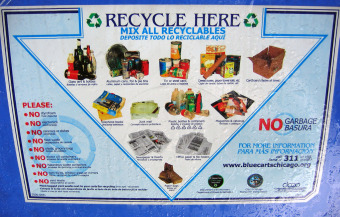Mayor Daley's Recycling Program So Successful, Participation is its Own Reward
By Kevin Robinson in News on Aug 4, 2009 4:20PM
Yes, it's true: Chicago's blue bag recycling program has been a resounding success. So much so, that we're now the greenest city in the world. And if that wasn't satisfaction enough to get the good people of the City that Works to step up to the plate and sort all those empty long necks out of their coffee grounds and chicken bones, the city is starting a pilot program that awards points to households that recycle on a regular basis.
10,000 homes in the 5th, 8th and 19th Wards will be part of the program, run by New York firm RecycleBank. The company is outfitting blue recycling carts with special ID tags that match the cart with the household. When a specially equipped recycling truck picks up the blue cart, it measures how much is being recycled and records the amount. Households then earn points, which can be redeemed for groceries, museum passes and discounts at restaurants, such as Leona's. And the first 200 households that register their carts will get White Sox tickets.
RecycleBank CEO Ron Gonen told the Sun-Times that incentives are a more effective way to encourage participation than penalties. "Government programs always work best when you create incentives," he said. 250 cities already participate in the program, but Chicago would be the largest thus far. Chicagoist has been critical of the blue bag program in the past, and I'll admit that I'm skeptical. But I'm not quite as skeptical as Sun-Times commenter 2hopper: ""No! It's a trick!!! Your f*cking prize will be a $50 fine every week if your blue cart isn't filled. Don't register. Once you do, that's it. You can't go back." The city says that they made nearly $2 million off the recycling program in '08, nearly twice what they earned in '07. If the program is successful, it will be introduced in 28,000 more households.
